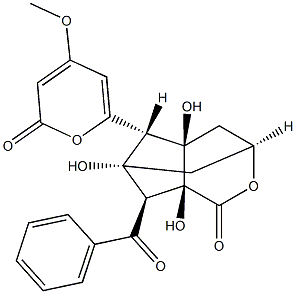Deoxyenterocin is a bacterial metabolite originally isolated from Streptomyces that has diverse biological activities, including antibiotic, antiviral, and antioxidant properties. It inhibits the growth of S. lutea, S. aureus, K. pneumoniae, and V. percolans in vitro when used at a concentration of 500 μg/ml. Deoxyenterocin (50 μg/ml) inhibits the cytopathic effect of influenza A H1N1 virus by 60.6% in vitro. It also prevents hydrogen peroxide-induced decreases in glutathione (GSH) levels and in the mitochondrial membrane potential in mouse primary cortical neuronal cultures when used at a concentration of 1 μM.
Deoxyenterocin is a minor co-metabolite of enterocin produced by several species of Streptomyces. Interestingly, deoxyenterocin was first isolated from an ascidian. Like enterocin, deoxyenterocin exhibits activity against both Gram positive and Gram negative bacteria but lack of availability has restricted a more extensive evaluation.

